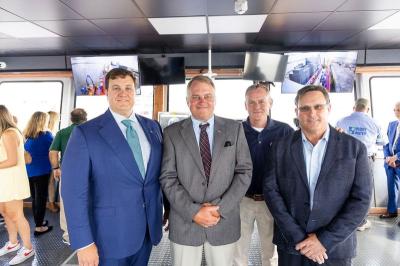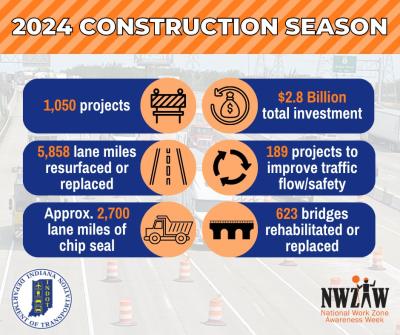When a nearly 60-year-old company survives and grows for years in one part of the country, expands into another region and eventually moves the whole operation from New York to North Carolina, some things should stay constant amidst all the changes.
For the Sunrock Group, one of those constant things has been its ever-growing fleet of Liebherr equipment.
“Carolina Sunrock has been using Liebherr equipment since our first unit, a R984B shovel, was purchased in 1989. That unit was traded in 2004 for a Liebherr R974B Litronic excavator to be used in the Kittrell quarry loading shot rock. Since that time we have added seven Liebherr wheel loaders and two Liebherr excavators to our equipment fleet. Our relationship with our local Liebherr representative Charlie McAlexander and Duane Wilder, president of Liebherr Construction Equipment, began in 2004 with the purchase of the R974B. Since that time, Charlie has been a great help to us in maintaining our existing Liebherr units and proper specing of new units,” said John Tankard, vice president of Plant and Equipment Services.
Liebherr’s newest wheel loader, the L586, is the world’s largest hydrostatically driven loader. It made its debut at ConExpo-Con/AGG earlier this year. It is the flagship of the 2plus2 range, which includes the L580, L566 and L550. Carolina Sunrock currently is demonstrating the L586 at its newest quarry in Woodsdale, N.C.
According to Liebherr, the main features of the 2plus2 range are cost-effectiveness and environmental friendliness. This wheel loader uses up to 25 percent less fuel than other manufacturers’ comparable machines under the same operating conditions. This success is the result of the 2plus2 drive technology. This technology is based on one gear with two different sized hydraulic or oil motors directly mounted, each supplying a separate coupling. Because at least one of the hydraulic motors is alternatively active when accelerating or decelerating, the wheel loader smoothly adapts itself to the required travel speed and drawbar pull independently in every operational situation.
Having equipment that can easily adapt to different operational conditions is key to Sunrock, where the only constant is change.
New Generation
When Bryan Pfohl became the president and sole owner of Lancaster Stone Products Corporation, Buffalo, N.Y., in 1981, there were two things he wanted to do. Of course, continuing to make a success of the company founded by his father Joseph and his uncles Paul and Fidelis was at the forefront of his mind.
But he also had a strong desire to live in the Southeast, which had been with him since he was a young boy drawn to the quality of life there. As an adult, he also knew that the Southeast had much economic promise for the future.
And so, by 1985 Pfohl had progressed in both of his ambitions by continuing the growth of the company in western New York while expanding into the Raleigh-Durham, N.C., area. The result was Carolina Sunrock LLC, which opened its first quarry in Butner, N.C., that year.
For more than 18 years, Pfohl managed both the New York and North Carolina operations. In 2001, the company had the opportunity to favorably exit the New York market and concentrate the company’s energy and resources in the Southeast.
It was a long journey for a company that had its beginnings after World War II, when the Pfohl brothers formed a small construction company in western New York. They realized that not only did they need aggregates for their own construction work, but also that the post-World War II economic conditions were causing a boom in construction-related industries. The brothers formed Pfohl Bros. Sand & Gravel.
Pfohl Bros. was eventually sold and in 1957 the brothers developed their first stone quarry and asphalt production and sales business, which was known as Lancaster Stone Products Corporation. In the early 1970s, a second quarry was added to the business followed by a sand and gravel operation in 1982.
Success in the South
When Bryan Pfohl made the decision to move completely out of the New York area, Lancaster Stone Products consisted of two quarries, a sand and gravel operation and four hot mix asphalt plants. The company held one of the two major positions in the Buffalo, N.Y., construction materials market.
It was a bold move to walk away from the long-established success of New York entirely, but a move that has served the company very well. With the sale of all New York interests, The Sunrock Group was born. Currently, the Sunrock Group has five locations in North Carolina: Butner, Kittrell, Woodsdale (the newest location), Durham, Raleigh and North Raleigh.
Since 2002, Sunrock has won numerous awards annually, such as North Carolina Department of Labor safety awards, a National Ready Mixed Concrete Association award for the graphic design on its concrete mixer fleet and the Carolinas Ready Mixed Concrete Association’s Driver of the Year for the past two years.
Sunrock also has taken great pride in becoming an active part of the North Carolina communities in which it operates. Civic involvement with schools and state and local organizations demonstrates that Sunrock is a good neighbor. Likewise, showing respect for the environment and the natural resources of the state also has helped Sunrock become a highly respected part of the community.
Employee Loyalty
Pfohl’s two daughters have become the third generation to enter the family business. Elisabeth Pfohl Sasser is a vice president who manages the Asphalt and Concrete division. Katherine Pfohl is the corporate secretary responsible for a variety of administrative functions at the corporate level. In addition, Elisabeth’s husband Kevin serves as the company’s manager of health and safety.
Pfohl also pointed out, “The company is blessed to have a number of dedicated production, maintenance and administrative managers and skilled employees.”
Some of these employees have been with the company for a very long time.
Albertine K. Moran, the founding chief financial officer, started working for the company in 1950. Since her retirement, she serves as a director on the company’s board. Gregory Kraemer, manager of special projects, has been with the company since 1976. During those 30-plus years, he has been responsible for quarry management, asphalt plant management, quality control management and a variety of special projects.
John Tankard, vice president of plant maintenance and equipment services, has been with the company nearly six years, from the beginning of the move into the South. He has, according to Pfohl, “played an integral role in the company’s growth since the sale of the Buffalo, N.Y., operations.”
Tankard is responsible for the company’s aggregate and recycling operations, fleet maintenance and new construction. About his time with Sunrock he said, “I have been with Carolina Sunrock for almost six years, beginning my career here as plant maintenance manager for the concrete and asphalt division. Prior to my joining Carolina Sunrock my experience had been in the concrete industry and fleet maintenance. My time here seems brief, as we have been so busy expanding the company. In the past six years, Carolina Sunrock has added two quarries, two concrete plants, three asphalt plants and recycling operations. I have had some part in the planning, construction and development of all these sites and have gained a wealth of knowledge and experience in the process.”
Past, Present and Future
Sunrock has seen a great deal of change since its inception in 1949. Different products, changing technologies, new locations; not much has stayed the same for the dynamic company.
“The most significant change in the industries in which Sunrock operates has been in business is the consolidation and the decrease in the number of independent and family-owned businesses, particularly in major markets. From an operations perspective, the evolution of the equipment that is employed in producing construction materials has offered greater productivity, ease, increased safety and comfort for the employees,” said Pfohl.
Nearly 30 years after taking charge of the operation, Pfohl’s thoughts on the future are simple, “Our organization continues to evolve. The family is dedicated to making investments that address our long-term goals and objectives and that above all, make good common sense.”
CEG
Today's top stories














